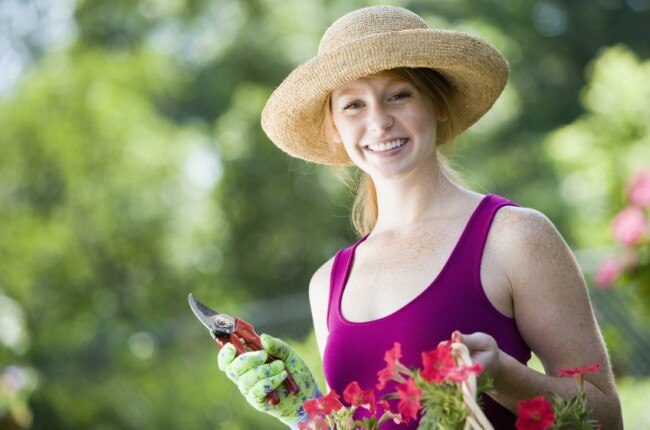Gardens can produce a bounty of fresh, organic produce, which has obvious nutritional benefits once it hits your kitchen table. But the benefits to gardening don’t stop at providing fruits and vegetables.
Gardening can improve your overall well-being, and many gardeners attest to its importance to their mental, physical and spiritual health.
Boost mood
Changing a negative attitude into a positive one may be a gardening session away.
According to a Dutch study by Wageningen University and Research Center, gardening has shown promise in boosting mood. Subjects were given a stressful task, then randomly assigned to 30 minutes of gardening or reading. Researchers found that self-reported positive mood was fully restored after gardening, but it further deteriorated after reading.
Shelley Sparks, licensed landscape architect and author of “Secrets of the Land, Designing Harmonious Gardens with Feng Shui,” describes the origins of that feel-good outlook we get from being outside.
“We are conditioned as humans to relate to nature. It’s only recent in our evolution that we live in houses. Being set aside from nature isn’t natural to us,” says Sparks. “Getting into nature is now an event versus an everyday part of life, as it was in human history. We’re wired to interact with nature, and when we don’t have that interaction, there’s something missing. When we do get back into the gardening or nature, we’re restoring that link that we have a need for as humans.”
Relieve Stress
Gardening is a healthy way to cope with and recover from stress.
According to Sustain, an alliance for better food and farming, simply looking at a green space through a window can reduce stress levels. Working in a natural or green setting can make this stress-relieving effect even stronger.
“Any gardener will attest to the calming, reassuring role a garden can provide. In times of stress, gardening is a physical outlet, a mental balm,” says Greg Seaman, founder of EarthEasy.com. “The garden is a place where we can bring our cares and concerns in hopes of better understanding.”
Get your exercise
Health professionals often underrate gardening as a form of exercise, according to a research paper published by the Community Food Security Coalition, or CFSC. But gardening is a great way to get physical activity, says the Centers for Disease Control and Prevention. Even moderate forms of gardening work can increase endurance and muscle strength.
“Gardening is an exercise that can also benefit those who are recovering from a physical illness,” says Sparks. “I believe in the combination of the physical aspect of retraining muscles and improving strength and coordination, and also the psychological aspect of doing so in nature.”
The CFSC found that gardening is associated with reduced risks of obesity, coronary heart disease and diabetes. An American Horticultural Therapy Association review of scientific literature finds that exercise from gardening promotes healthy weight management. In fact, a study of community gardeners in Salt Lake City compared the body mass indexes of the community gardeners to the BMIs of their neighbors, siblings and spouses, and found that the gardeners had significantly lower BMIs.
The National Institutes of Health suggests doing 30 to 45 minutes of gardening three to five times a week as part of a strategy to combat obesity.
Boost self-esteem
Providing an opportunity for social interaction and a sense of independence, gardening can improve self-esteem. A Kansas State University study compared the self-esteem and overall life satisfaction in older adults, both gardeners and non-gardeners, and found that those who use their hands to mix soil, pull weeds and fill pots have higher self-esteem.
The impact gardening has on confidence is even more profound in an urban setting. The CFSC found that the mere presence of inner-city community gardens is associated with lower crime rates, as the gardens offer a project to take pride in, and a method for rising above social, health and environmental injustice.
Fight depression
When you’re stuck in a state of melancholy, skip the retail therapy, and opt for horticultural therapy.
“Horticultural therapy as a treatment for many psychological and physical disorders is a valid and increasingly popular intervention,” Mitchell Hewson, registered horticultural therapist, told USA Today. “Clients who have benefited from this type of therapy report a renewed desire to live.”
The good news is, you don’t have to be a master gardener to harvest the benefits of gardening. Simply interacting with a plant is a healing experience. And like anything else, skills come with education, experience and trial and error.
“Anyone can have a green thumb with very little effort. Gardening advice is available to anyone with an internet connection,” says Seaman. “Even a small planter on a balcony can provide rewards to one’s health and feeling of well-being.”
“Start with plants that are easy to take care of, and build success from there,” says Sparks. “Take zucchini. Very few people can kill zucchini. That was my first vegetable. I succeeded with that, and then moved onto tomatoes.”
Another fun way to get started with gardening is to plant herbs or plants you may have in your bath and beauty products, or in pill form.
“Everyone’s crazy about lavender now,” says Sparks. “It treats insomnia, depression and anxiety. Try planting it in your garden to enjoy the beauty of it.”

